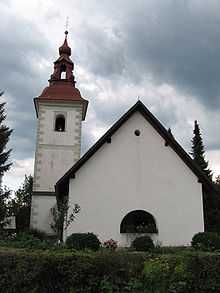Radegund
| Saint Radegund | |
|---|---|
 Radegund retires to the monastery dedicated to the Virgin Mary. | |
| Born | ~520 |
| Died | August 13, 586 |
| Honored in | Roman Catholic Church, Eastern Orthodox Church |
| Canonized | 9th century[citation needed] |
| Feast | August 13 |
| Patronage | Jesus College, Cambridge |
Radegund (also spelled Rhadegund, Radegonde, Radigund) (ca. 520–586) was a 6th-century Frankish princess, who founded the monastery of the Holy Cross at Poitiers. Canonized in the 9th century, she is the patron saint of several English churches and of Jesus College, Cambridge (whose full name "The College of the Blessed Virgin Mary, Saint John the Evangelist and the glorious Virgin Saint Radegund, near Cambridge".
Life

Radegund was born about 520 to Bertachar, one of the three kings of the German land Thuringia.[1] Radegund's uncle, Hermanfrid, killed Bertachar in battle, and took Radegund into his household. After allying with the Frankish King Theuderic, Hermanfrid defeated his other brother Baderic. However, having crushed his brothers and seized control of Thuringia, Hermanfrid reneged on his agreement with Theuderic to share sovereignty.
In 531, Theuderic returned to Thuringia with his brother Clotaire I. Together they defeated Hermanfrid and conquered his kingdom. Clotaire I also took charge of Radegund, taking her back to Merovingian Gaul[1] with him. He sent the child to his villa of Athies in Picardy for several years, before marrying her in 540.[2]
Radegund was one of Clotaire I’s six wives or concubines (the other five being Guntheuca who was the widow of his brother Chlodomer, Chunsina, Ingund, Ingund’s sister Aregund and Wuldetrada the widow of Clotaire's grand-nephew Theudebald). She bore him no children. By 550 Radegund's brother was the last surviving male member of the Thuringian royal family. Chlothar had him murdered. She fled the court and sought the protection of the Church, persuading the bishop of Noyon to consecrate her a deaconess;[1] later founding the Convent of Our Lady of Poitiers.
Living under the Rule of Caesaria of Arles, the cloistered sisters were required to be able to read and write, and to devote several hours of the day to reading the scriptures and copying manuscripts, as well as such traditionally tasks such as weaving and needlework.[3]
Radegund was a close friend of Junian of Maire; Junian and Radegonde are said to have died on the same day, on August 13, 586.[4]
Literary connections
Radegund was extensively written about and to by the poet Venantius Fortunatus and the bishop, hagiographer, and historian Gregory of Tours. She wrote Latin poems to him on tablets that have been lost. The three of them seem to have been close and Fortunatus' relations with Radegund seem to have been based on friendship. There are two poems written in the voice of Radegund, De Excidio Thoringiae and Ad Artachin. While it has been proposed that Venantius wrote them, recent historians see her as the author.[5]
Another hagiography was authored by the nun Baudovinia.
Radegund's funeral, at which Venantius Fortunatus and Gregory of Tours attended, was three days later. She was buried in Église Sainte-Radegonde-de-Poitiers.
Later history


Five English parish churches are dedicated to her, and she had a chapel in Old St Paul's Cathedral, as well as in Gloucester, Lichfield, and Exeter Cathedrals. St. Radegund's Abbey, near Dover, was founded in her honour in 1191. She is also a patron saint of Jesus College, Cambridge, which was founded on the site of the 12th century Nunnery of Saint Mary and Saint Radegund.
The St Radegund public house in Cambridge is named in her honour. St Rhadagund's Holiday and Conference Centre on the Isle of Wight is also named after her.
There are many places named Sainte-Radegonde in France.
References
- ↑ 1.0 1.1 1.2 "St. Radegund", Jesus College, Cambridge
- ↑ "Radegund of Thuringia", Columbia University
- ↑ "St Radegund" the nunnery and its history rediscovered", Jesus College Cambridge
- ↑ "Quelques saints du Poitou et d'ailleurs". ?. Retrieved May 7, 2009.
- ↑ Stevenson. p. 88. Missing or empty
|title=(help)
Sources
- Gregory of Tours, Glory of the Confessors, translation by R. Van Dam (Liverpool, 1988)
- Jane Stevenson (2005). Women Latin poets: language, gender, and authority, from antiquity to the Eighteenth Century. Oxford University Press.
- Gregory of Tours, History of the Franks, translation by L. Thorpe (Penguin, 1974: many reprints)
- Venantius Fortunatus, The Life of the Holy Radegund, translation by J. McNamara and J. Halborg
- Julia M.H. Smith, "Radegundis peccatrix: authorizations of virginity in late antique Gaul," in Philip Rousseau and Emmanuel Papoutsakis (eds), Transformations of late antiquity: essays for Peter Brown Vol. 2 (Aldershot, Ashgate, 2009), 303-326.
- Jason Glenn, "Two Lives of Saint Radegund," in Jason Glenn (ed), The Middle Ages in Texts and Texture: Reflections on Medieval Sources (Toronto, University of Toronto, 2012),
External links
- Other Women's Voices Useful guide to some of the works on Radegund including links to on-line materials.
- Letters of Radegund of Thuringia, Epistolae, Columbia University
-
 "Radegunda, St". Encyclopædia Britannica 22 (11th ed.). 1911. p. 784
"Radegunda, St". Encyclopædia Britannica 22 (11th ed.). 1911. p. 784 -
 Wace, Henry; Piercy, William C., eds. (1911). "Radegundis, St". Dictionary of Christian Biography and Literature to the End of the Sixth Century (third ed.). London: John Murray.
Wace, Henry; Piercy, William C., eds. (1911). "Radegundis, St". Dictionary of Christian Biography and Literature to the End of the Sixth Century (third ed.). London: John Murray. -
 "Radegundis, Saint". New International Encyclopedia. 1905.
"Radegundis, Saint". New International Encyclopedia. 1905.